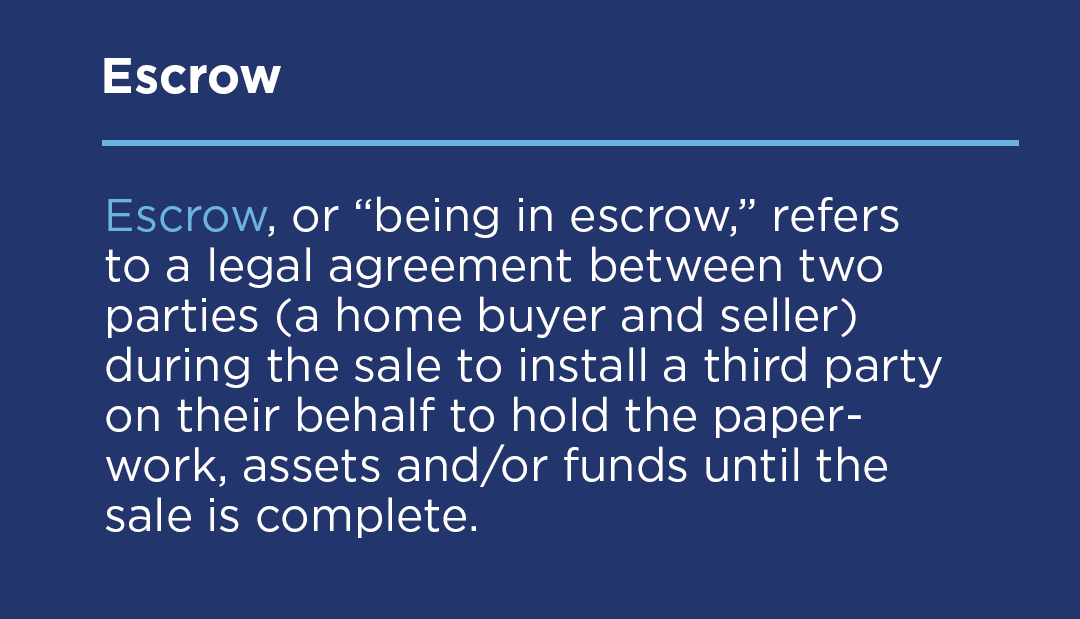Buying a home can be a long, detailed process that involves several steps. Escrow occurs between the time the seller accepts the buyer’s offer and the time the buyer receives the key to the home. Here’s what you need to know about escrow.
What is escrow?
Escrow, or “being in escrow,” refers to a legal agreement between two parties (buyer and seller) during a transaction process (such as selling a home) to install a third party on their behalf to hold the paperwork, assets and/or funds until the transaction is complete.

When buying a home, you’ll be in escrow from the time you are under contract (when the seller accepts your offer) until the day of closing (you take on ownership). During that time, your real estate agent will collect a good faith deposit from you, which will later be applied to your down payment. These funds will be collected by an escrow company, a neutral third party responsible for collecting the required funds and documents in the closing process. (Some states dictate that the escrow company is chosen by the buyer, or the buyer’s agent; in others, it is chosen by the seller, or the seller’s agent, or, the buyer and seller can decide who makes this choice or reach a unified decision together.) The collected funds will be deposited into an escrow account at the escrow company specified in the purchase agreement (the contract for the home, which is drawn up before the escrow process begins). During this time, the mortgage lender and their legal representatives are working to complete the sale and ensure you can afford homeownership.
While you are in escrow, you will also begin working with a title company. The “title” refers to the ownership record of the property you are purchasing. In addition to a history of the home’s ownership, the title will include a physical description of the property and show any liens on it. The title company, which can be selected and hired by the lender, the buyer, or the seller, will carefully research the title of the home for any possible liens, omissions and other errors. The title company also provides title insurance, as described below.
What are the steps of the escrow process?
Being in escrow involves several steps. Some of these will be happening simultaneously, but this is the general order of the process:
- Open an escrow account. This can be done by the seller, the seller’s agent, or the buyer or buyer’s agent.
- Have the home appraised and inspected. Your mortgage lender will have the home appraised to determine whether its appraised value is equal to the sale price. If the sale price exceeds the appraised value, the mortgage lender may refuse to extend the agreed-upon loan amount unless you pay the difference in cash. Alternatively, the seller may agree to lower the price of the home. At this time, it’s also recommended that you have the home professionally inspected for structural integrity and the overall quality of all systems.
- Approve seller disclosures. The seller will need to disclose all the faults in the property. You may have already been aware of some of these, but it’s important to review them now so you know exactly what you’re getting with this purchase.
- Obtain insurance. Next, you’ll need to buy a homeowners insurance policy, which covers the cost of specified damage to the home. You’ll also need to purchase title insurance at this time. There are two kinds of title insurance policies. A lender’s policy protects the lender if a problem arises with the title and is generally required when the lender issues a mortgage loan. State laws and customs vary on who pays for title insurance, but home buyers typically cover the cost. An owner’s policy, on the other hand, protects the buyer from possible problems with the title, such as liens, undisclosed heirs and errors or omissions in the deed. This policy is purchased by the buyer at the time of closing.
- Receive a title report. Your lender will provide you with a title report so you can verify that there are no liens on the property and the title is clear.
- Secure financing. During escrow, when your lender has a street address for your future home, they will prepare a good faith estimate, which details the loan amount, interest rate and the closing costs associated with the purchase. If a financing contingency was part of your contract, it will be removed at this point. Pro tip: having a mortgage pre-approval from your chosen lender will help speed up this step and reduce a lot of stress that comes with the overall process.
- Do a final walkthrough. Just before closing, take a walk through the house to be sure everything is in agreed-upon condition.
- Closing. During this step, you’ll pay the remainder of your down payment and closing fees, and sign a mountain of documents to finalize the sale. When the closing is over, you’ll walk away with the keys to your new home.
What happens to my escrow account after closing?
When you’ve closed on your home, the funds in your escrow account will be withdrawn to be used for the down payment. Then, a different kind of escrow account, managed by your mortgage lender, may be opened in its stead. This account will hold all funds that go toward property taxes and homeowners insurance. If relevant, the account will hold funds to cover mortgage insurance as well. Instead of billing you for these payments when they come due, your lender will divide the total annual amounts by 12 and add them to your monthly mortgage payment. This makes budgeting for these bills and remembering to pay them a whole lot easier. Note, it is usually an optional service offered by your lender, so if you’d rather budget for and make these payments on your own, you may do so.
What are the dos and don’ts of being in escrow?
While you’re in escrow, your financial health and credit history will be carefully examined. Even if you’ve already secured a preapproval, the mortgage lender can pull out of the agreement at any point during escrow. For this reason, it’s best to follow these dos and don’ts for ensuring your financial health remains in strong condition throughout the escrow process:
Do:
- Continue using a minimal amount of your available credit each month.
- Pay your credit card bills, and all other bills, on time, or before they’re due.
- Follow up on the escrow process to be sure you’re up-to-date on all your tasks, such as signing documents and ordering an inspection.
Don’t:
- Close any credit cards.
- Change jobs.
- Buy or lease a car.
- Use a cash advance or payday lender.
- Buy new furniture, or another large purchase, using credit.
The escrow process is a long and detailed step of buying a home. Use this guide to stay in the know about escrow.






Comments Section
Please note: Comments are not monitored for member servicing inquiries and will not be published. If you have a question or comment about a Quorum product or account, please visit quorumfcu.org to submit a query with our Member Service Team. Thank you.